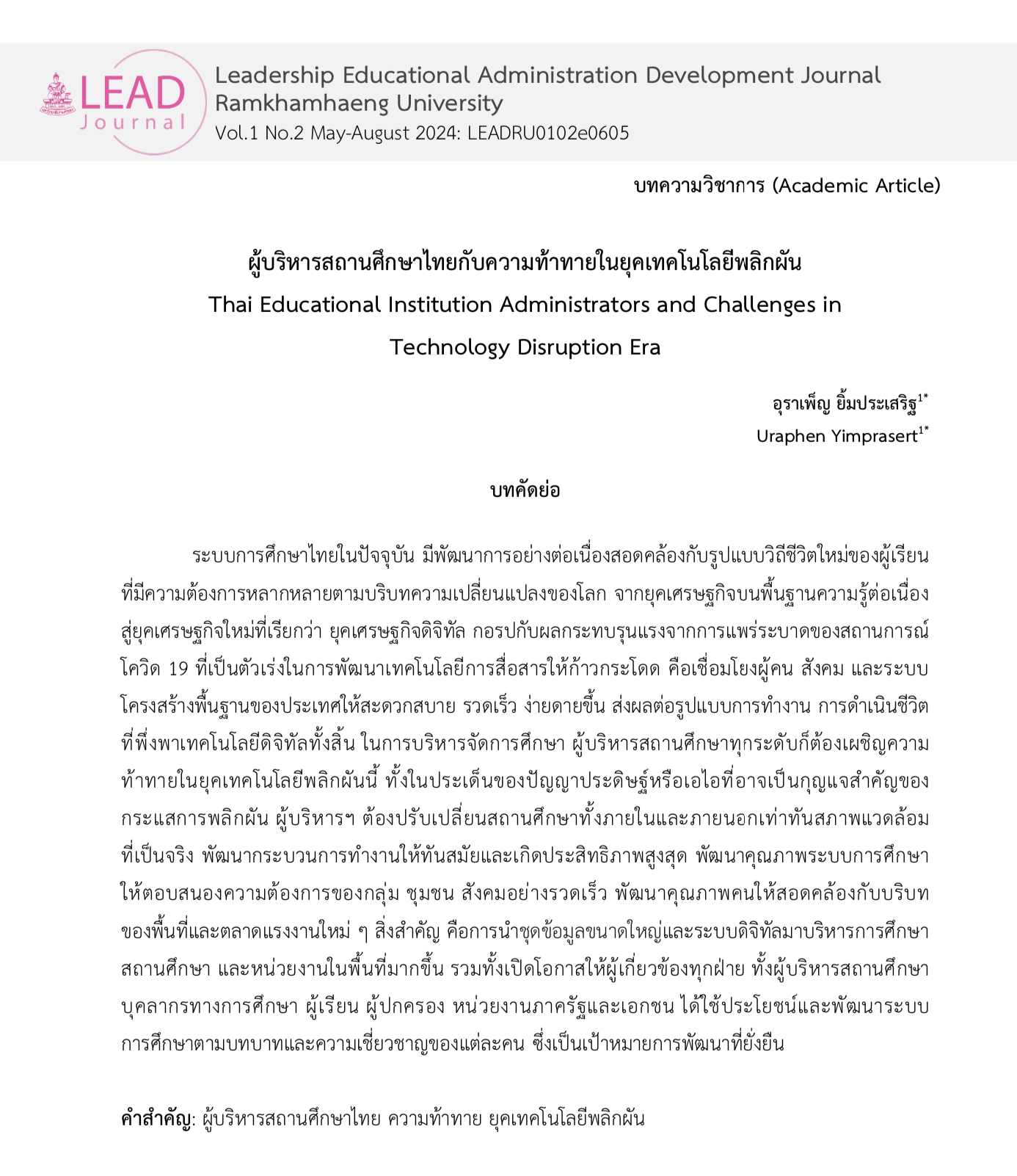ผู้บริหารสถานศึกษาไทยกับความท้าทายในยุคเทคโลยีพลิกผัน
Main Article Content
บทคัดย่อ
ระบบการศึกษาไทยในปัจจุบัน มีพัฒนาการอย่างต่อเนื่องสอดคล้องกับรูปแบบวิถีชีวิตใหม่ของผู้เรียนที่มีความต้องการหลากหลายตามบริบทความเปลี่ยนแปลงของโลก จากยุคเศรษฐกิจบนพื้นฐานความรู้ต่อเนื่องสู่ยุคเศรษฐกิจใหม่ที่เรียกว่า ยุคเศรษฐกิจดิจิทัล กอรปกับผลกระทบรุนแรงจากการแพร่ระบาดของโรคโควิด-19 ที่เป็นตัวเร่งในการพัฒนาเทคโนโลยีการสื่อสารให้ก้าวกระโดด คือเชื่อมโยงผู้คน สังคม และระบบโครงสร้างพื้นฐานของประเทศให้สะดวกสบาย รวดเร็ว ง่ายดายขึ้น ส่งผลต่อรูปแบบการทำงาน การดำเนินชีวิตที่พึ่งพาเทคโนโลยีดิจิทัลทั้งสิ้น ในการบริหารจัดการศึกษา ผู้บริหารสถานศึกษาทุกระดับก็ต้องเผชิญความท้าทายในยุคเทคโนโลยีพลิกผันนี้ ทั้งในประเด็นของปัญญาประดิษฐ์หรือเอไอที่อาจเป็นกุญแจสำคัญของกระแสการพลิกผัน ผู้บริหารฯ ต้องปรับเปลี่ยนสถานศึกษาทั้งภายในและภายนอกเท่าทันสภาพแวดล้อมที่เป็นจริง พัฒนากระบวนการทำงานให้ทันสมัยและเกิดประสิทธิภาพสูงสุด พัฒนาคุณภาพระบบการศึกษาให้ตอบสนองความต้องการของกลุ่ม ชุมชน สังคมอย่างรวดเร็ว พัฒนาคุณภาพคนให้สอดคล้องกับบริบทของพื้นที่และตลาดแรงงานใหม่ๆ สิ่งสำคัญ คือการนำชุดข้อมูลขนาดใหญ่และระบบดิจิทัลมาบริหารการศึกษา สถานศึกษา และหน่วยงานในพื้นที่มากขึ้น รวมทั้งเปิดโอกาสให้ผู้เกี่ยวข้องทุกฝ่าย ทั้งผู้บริหารสถานศึกษา บุคลากรทางการศึกษา ผู้เรียน ผู้ปกครอง หน่วยงานภาครัฐและเอกชน ได้ใช้ประโยชน์และพัฒนาระบบการศึกษาตามบทบาทและความเชี่ยวชาญของแต่ละคน ซึ่งเป็นเป้าหมายการพัฒนาที่ยั่งยืน
Downloads
Article Details

อนุญาตภายใต้เงื่อนไข Creative Commons Attribution-NonCommercial-NoDerivatives 4.0 International License.
The authors are solely accountable for the ideas and recommendations articulated in the articles published in The LEAD Journal RU. Should there be any inaccuracies, the authors accept full responsibility for such errors.
Moreover, the Editorial Board, Editorial Team, and Committee of The LEAD Journal RU are committed to maintaining the integrity of the principles reflected in the authors' contributions.
Consequently, Ramkhamhaeng University, the Editorial Board, Editorial Team, and Editors shall not be held liable for any outcomes arising from the authors' presentation of their ideas and recommendations within The LEAD Journal RU.
เอกสารอ้างอิง
Bussaratis, T. (2016). Influence of CRM Message Communication via Chatbot on Customer Engagement Level. (Master of Independent Study, Thammasat University). [In Thai].
Chaemchoy, S. (1999). Technology Leadership: Leading Technology into 21st Century School, Journal of Education Naresuan University, 16(4), 216–224. [In Thai].
Chantacho, S., (2023). The Roles of School Administrators in the Volatility Uncertainty, Complexity and Anxiety World (VUCA) Affecting the Application of Digital Technology for Teaching and Learning in Schools under Trat Primary Educational Service Area Office. (Master Thesis, Rambhai Barni Rajabhat University). [In Thai].
Klangjai, S. (2024). AI and Education in the Future: 2030. Retrieved from https://klangjai.medium.com/ai-กับการศึกษา-2023-965000c4c250. [In Thai].
Keesukphan, E. (2016). School Management in Digital Era. Retrieved from https://www.trueplookpanya.com/education/content/52232. [In Thai].
Khumsamart, S., Kuljittree, S. and Juntapala, K. (2020). The Guidelines for Educational Administration in the Digital Distribution Era. Journal of Modern Learning Development, 5(3), 245-259. [In Thai].
Mitchell, T. M. (2006). The Discipline of Machine Learning. Retrieved from https://www.cs.cmu.edu/afs/cs/usr/mitchell/ftp/pubs/MachineLearningTR.pdf.
Mrazek, P. (2022). Administration of Educational Organization in Digital Era. (Master Thesis, Burapha University). [In Thai].
Osadhapiruk, S., Jenkwao, S., Deekawong, S. and Thaweesinthisut, C. (2024). Learning Management in the Digital Disruption Era. Bangkok: Pacific Institute of Management Science. [In Thai].
Pahay, S. (2022). Ubiquitous Education: Anywhere and Anytime. Phrae: Phrae Thai Publishing Industry. [In Thai].
Phongphattharakarn, P. (2024). AI is the Future, but Education is the Upstream. Retrieved from https://www.eef.or.th/article-342124/. [In Thai].
Sinthuphan, L., Chewpimai, D., Hiepkaew, T., Phonyiam, K., Wongchaisiri, P., Riwphongkul, P., Faktang I. and Rattansuwan, K., (2023). Lesson Learned from the Training Process for Increasing Academic Services Competency in the Digital Disruption Era of Academic Services Department, Office of Academic Services, Khon Kaen University. Journal of Office of Academic Service for Society (JOASS), 2(1), 1-14. [In Thai].
Siriwan, N. (2024). Improving the Administration Quality of Public Sector: A Case Study of an Organization that Received the Government Administration Quality Award, Category 3, Focusing on Service Recipients and Stakeholders. Bangkok: National Assembly Library of Thailand. [In Thai].
Sullivan, L. (2017). 8 Skills Every Digital Leader Needs. Retrieved from https://www.cmswire.com/digital-workplace/8-skills-every-digital-leader-needs/.
Thotsata, O. (2021). Transformational Leadership of Educational Institution Administrators Affects the Learning Organization of Educational Institutions. Academic journal of North Bangkok University. 10(2), 188–199. [In Thai].
Vicheanpant, T. (2024). Comparison of Results 18 Methods of Active Learning Conduct to Analyze Learning Style of the Learners in Higher Education based on Kolb's Model. Chonburi: Office of Research and Innovation Development. [In Thai].
Wanasri, J. (2022). Educational Administration in the Digital Age, 1st ed. Phitsanulok: Rattana Suwan Publishing. [In Thai].
Wess, S. (2017). Robots will take over Human Jobs: A Future Look at Artificial Intelligence with Dr.Stefan Wess, the Momentum. Retrieved from https://themomentum.co/successful-innovation-design-cu2016-artificial-intelligence.


